
The men's eight event was a rowing event conducted as part of the 1964 Summer Olympics programme. It was held from 12 to 15 October at the Toda Rowing Course. There were 14 boats from 14 nations, with each nation limited to a single boat in the event. The event was won by the United States, returning the top of the podium after losing their eight-Games winning streak with a fifth-place finish in 1960; it was the nation's 11th overall victory in the men's eight. The defending champions, the United Team of Germany, took silver; the Germans defeated the United States in the opening round but lost the rematch in the final after the Americans advanced through the repechage. Czechoslovakia repeated as bronze medalists.
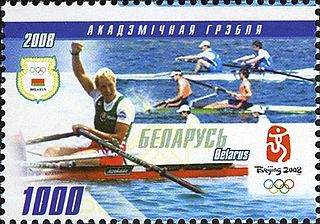
The men's single sculls competition at the 2008 Summer Olympics in Beijing was held between 9 and 16 August, at the Shunyi Olympic Rowing-Canoeing Park. There were 32 competitors from 32 nations. The event was won by Olaf Tufte of Norway, the fifth man to successfully defend an Olympic title in the event. The silver medal went to Ondřej Synek of the Czech Republic, the nation's first medal in the event. Mahé Drysdale of New Zealand earned bronze. Both Synek and Drysdale would go on to win medals in the event again in 2012 and 2016.
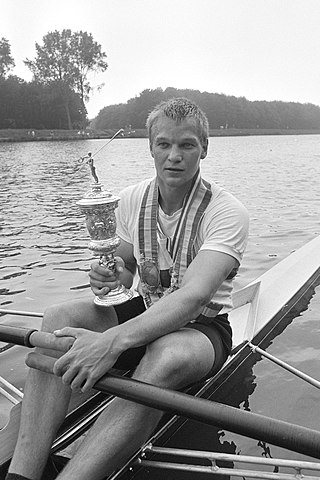
The men's single sculls competition at the 1992 Summer Olympics in Barcelona was held from 27 July to 1 August at Lake of Banyoles. The event was an open-style, individual rowing event conducted as part of the Rowing at the 1992 Summer Olympics programme. There were 22 competitors from 22 nations, with each nation limited to a single boat in the event. The event was won by Thomas Lange of Germany, the fourth man to successfully repeat as Olympic champion. It was the first appearance of "Germany" since 1936, though German rowers representing the United Team of Germany, West Germany, and East Germany had won 10 medals in 8 Games from 1960 to 1988. Václav Chalupa of Czechoslovakia took silver, that nation's first medal in the men's single sculls. Poland's Kajetan Broniewski earned that nation's first medal in the event since 1960 with his bronze.

The men's single sculls competition at the 2012 Summer Olympics in London took place at Dorney Lake which, for the purposes of the Games venue, was officially termed Eton Dorney. It was held from 28 July to 3 August. There were 33 competitors from 33 nations. The event was won by Mahé Drysdale of New Zealand, the nation's first victory in the event since 2000. Ondřej Synek of the Czech Republic earned his second consecutive silver in the event; Drysdale and Synek were the 13th and 14th men to win multiple medals in the single sculls; they would go on to be the 5th and 6th to earn three in the event in 2016 when Drysdale repeated as champion and Synek added a bronze. The 2012 bronze went to Alan Campbell, Great Britain's first medal in the event since 1928.
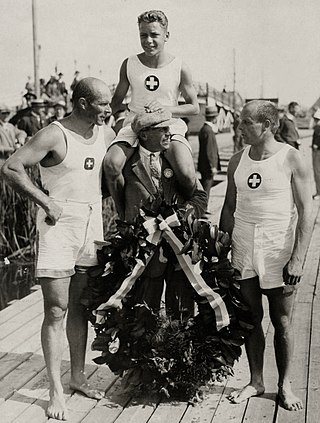
The men's coxed pair event was part of the rowing programme at the 1928 Summer Olympics. It was one of seven rowing events for men and was the fourth appearance of the event. It was held from 3 to 10 August near Sloten, Amsterdam. There were 6 boats from 6 nations, with each nation limited to one boat in the event. The event was won by the Swiss team, the nation's second consecutive victory in the event. Brothers Hans Schöchlin and Karl Schöchlin rowed, with Hans Bourquin the coxswain. Another pair of brothers took silver: France's Armand Marcelle and Édouard Marcelle. The Belgian bronze medal team consisted of Léon Flament, François de Coninck, and Georges Anthony; it was the nation's first medal in the event.

The men's single sculls competition at the 1972 Summer Olympics in Munich took place from 27 August to 2 September at the Olympic Reggatta Course in Oberschleißheim. There were 18 competitors from 18 nations, with each nation limited to a single boat in the event. The event was won by Yury Malyshev of the Soviet Union, the nation's fifth victory in the event; the Soviets returned to the top of the podium after having their four-Games (1952–1964) winning streak broken in 1968. Alberto Demiddi of Argentina took silver, the seventh man to win multiple medals in the single sculls. Wolfgang Güldenpfennig earned bronze, the first medal for East Germany as a separate team.

The men's coxed pair competition at the 1972 Summer Olympics in Munich took place from 27 August to 2 September at the Olympic Regatta Course in Oberschleißheim. There were 21 boats from 21 nations, with each nation limited to a single boat in the event. The event was won by East German crew Wolfgang Gunkel, Jörg Lucke, and coxswain Klaus-Dieter Neubert; it was the first medal in the event for East Germany as a separate nation. Czechoslovakia (silver) and Romania (bronze) also won their first medals in the men's coxed pair.

The men's coxed four competition at the 1972 Summer Olympics in Munich took place from 27 August to 2 September at the Olympic Reggatta Course in Oberschleißheim. There were 14 boats from 14 nations, with each nation limited to a single boat in the event. The event was won by West Germany; it was the nation's first medal as a separate team, but the third time in four Games that a West German crew had won gold. East Germany repeated as silver medallists, though with a new crew. Bronze went to Czechoslovakia, the nation's first medal in the men's coxed four since 1952.

The men's single sculls competition at the 1976 Summer Olympics took place at Notre Dame Island Olympic Basin, Canada. The event was held from 18 to 25 July. There were 15 competitors from 15 nations, with each nation limited to a single boat in the event. The event was won by Pertti Karppinen of Finland, the nation's first medal in the men's single sculls. Karppinen would go on to win three consecutive golds in the event, matching the Soviet Union's Vyacheslav Ivanov who did the same from 1956 to 1964. Silver went to Peter-Michael Kolbe of West Germany; East Germany took its second consecutive bronze medal in the event, this time with Joachim Dreifke as the rower.

The men's single sculls rowing competition at the 1980 Summer Olympics took place at Krylatskoye Sports Complex Canoeing and Rowing Basin, Moscow, Soviet Union. The event was held from 20 to 27 July. There were 14 competitors from 14 nations, with each nation limited to a single boat in the event. The event was won by Pertti Karppinen of Finland, his second of three consecutive victories from 1976 to 1984. Karppinen was the eighth man to win multiple medals in the event. Silver went to Vasil Yakusha of the Soviet Union, the nation's sixth medal in eight Games. East Germany took a third consecutive bronze medal, all by different rowers as Peter Kersten was the nation's men's single sculler this Games.
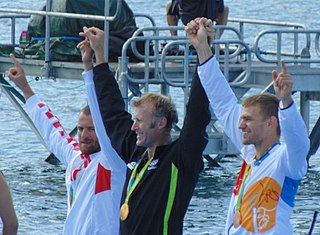
The men's single sculls competition at the 2016 Summer Olympics in Rio de Janeiro was held from 6 to 13 August at the Lagoon Rodrigo de Freitas. There were 32 competitors from 32 nations. The event was won by Mahé Drysdale of New Zealand, the sixth man to successfully defend an Olympic title in the event. He won an exceptionally close final against Damir Martin of Croatia. Martin's silver was Croatia's first medal in the event. Bronze went to Ondřej Synek of the Czech Republic. Both Drysdale and Synek earned their third medal in the event; Drysdale had taken bronze in 2008 before winning in 2012 and 2016, while Synek had twice been the runner-up in 2008 and 2012 before this third-place finish.

The men's eight competition at the 2016 Summer Olympics in Rio de Janeiro took place at the Rodrigo de Freitas Lagoon. It was held from 8 to 13 August. There were 7 boats from 7 nations. The event was won by Great Britain, the nation's first victory in the men's eight since 2000 and fourth overall. Defending champions Germany finished with silver this time. The Netherlands earned bronze.

The men's eight competition at the 1948 Summer Olympics took place at Henley-on-Thames, near London. It was held from 5 to 9 August. There were 12 boats from 12 nations, with each nation limited to a single boat in the event. The event was won by the United States, the nation's sixth consecutive and eighth overall gold medal in the men's eight; the Americans had won every time they competed. Great Britain, the only other nation to have won in the event, finished second for its first medal in the event since 1928. Norway took bronze, its first medal in the men's eight since 1920.
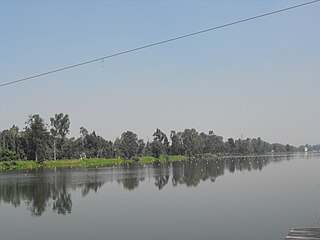
The men's coxed four competition at the 1968 Summer Olympics took place at Virgilio Uribe Rowing and Canoeing Course, Mexico City, Mexico. It was held from 13 to 19 October and was unexpectedly won by the team from New Zealand, which secured the country its first Olympic rowing gold medal. Thirteen teams from 13 nations attended the competition. East Germany earned its first medal in its debut in the event, taking silver. Switzerland took bronze, its first medal in the men's coxed four since 1952.

The men's coxed four (M4+) competition at the 1976 Summer Olympics took place at the rowing basin on Notre Dame Island in Montreal, Quebec, Canada. It was held from 18 to 25 July and was won by the team from Soviet Union. There were 14 boats from 14 nations, with each nation limited to a single boat in the event. The victory was the Soviet Union's first medal in the men's coxed four. East Germany took its third consecutive silver medal, with entirely different crews each time. The defending champion West Germany received bronze this time. Hans-Johann Färber, the only rower from the 1972 gold medal team to return, became the fifth man to earn multiple medals in the event.

The men's eight competition at the 1976 Summer Olympics took place at the rowing basin on Notre Dame Island in Montreal, Quebec, Canada. It was held from 18 to 25 July and was won by the team from East Germany. It was East Germany's first victory in the event, improving on a bronze medal in 1972. The defending champions, New Zealand, switched places with the East Germans, taking bronze in 1976. Between them was Great Britain, taking its first men's eight medal since 1948. There were 11 boats from 11 nations, with each nation limited to a single boat in the event.

The men's eight competition at the 1952 Summer Olympics took place at Meilahti, Finland. It was held from 20 to 23 July. There were 14 boats from 14 nations, with each nation limited to a single boat in the event. The event was won by the United States, the nation's seventh consecutive and ninth overall gold medal in the men's eight; the Americans had won every time they competed. The Soviet Union took silver in its Olympics debut; Australia's bronze was its first medal in the men's eight.

The men's eight competition at the 1956 Summer Olympics took place at Lake Wendouree near Ballarat, Australia. It was held from 23 to 27 November. There were 10 boats from 10 nations, with each nation limited to a single boat in the event. The event was won by the United States, the nation's eighth consecutive and 10th overall gold medal in the men's eight; the Americans had won every time they competed. Canada took silver, its first medal in the men's eight since 1932. Australia repeated as bronze medalists.

The men's coxed four competition at the 1960 Summer Olympics took place at Lake Albano, Italy. It was held from 31 August to 3 September. There were 21 boats from 21 nations, with each nation limited to a single boat in the competition. The event was won by the United Team of Germany in its debut in the event. Silver went to the French crew, the nation's first medal in the event since 1936. The defending champions Italy received bronze this time. In an event which saw constant turnover even from consistently strong nations, three members of the Italian team returned from the 1956 gold-medal crew to earn a second medal this Games: Romano Sgheiz, Ivo Stefanoni, and Franco Trincavelli were only the 2nd, 3rd, and 4th men to earn multiple medals in the coxed four.

The men's coxed pair competition at the 1968 Summer Olympics took place at Virgilio Uribe Rowing and Canoeing Course, in the Xochimilco borough of Mexico City. It was held from 13 to 19 October. There were 18 boats from 18 nations, with each nation limited to a single boat in the event. The event was won by the Italian crew, rowers Primo Baran and Renzo Sambo and coxswain Bruno Cipolla; it was Italy's first victory in the event since 1920 and second overall. The Netherlands made the podium for the second consecutive Games, though with an all-new team: Herman Suselbeek, Hadriaan van Nes, and cox Roderick Rijnders took silver. A Danish boat medaled in the event for the first time since 1952, with Jørn Krab, Harry Jørgensen, and Preben Krab earning bronze. The American medal streak of three Games ended with the United States boat placing fifth.
















